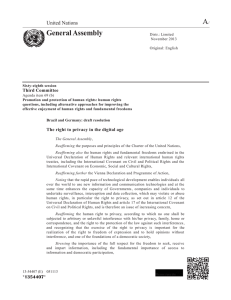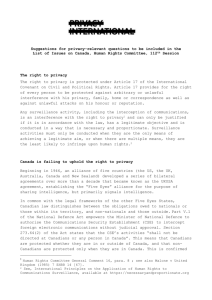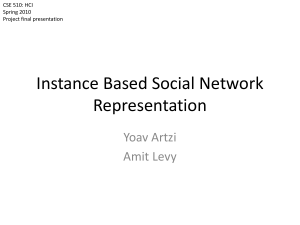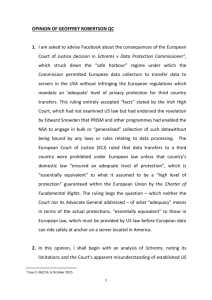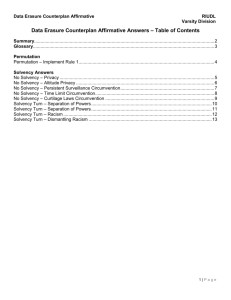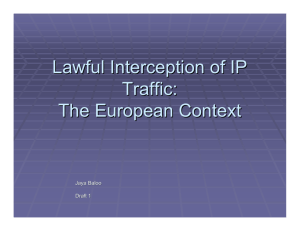Issue 4 - Finland - Carlucci American International School of Lisbon
advertisement
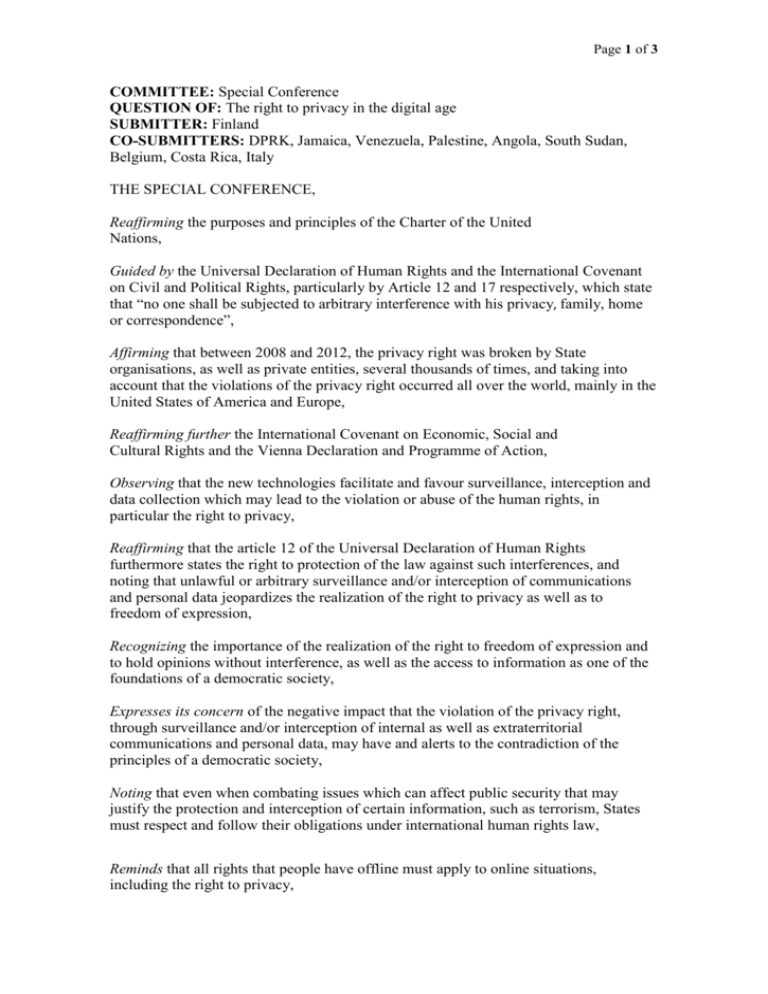
Page 1 of 3 COMMITTEE: Special Conference QUESTION OF: The right to privacy in the digital age SUBMITTER: Finland CO-SUBMITTERS: DPRK, Jamaica, Venezuela, Palestine, Angola, South Sudan, Belgium, Costa Rica, Italy THE SPECIAL CONFERENCE, Reaffirming the purposes and principles of the Charter of the United Nations, Guided by the Universal Declaration of Human Rights and the International Covenant on Civil and Political Rights, particularly by Article 12 and 17 respectively, which state that “no one shall be subjected to arbitrary interference with his privacy, family, home or correspondence”, Affirming that between 2008 and 2012, the privacy right was broken by State organisations, as well as private entities, several thousands of times, and taking into account that the violations of the privacy right occurred all over the world, mainly in the United States of America and Europe, Reaffirming further the International Covenant on Economic, Social and Cultural Rights and the Vienna Declaration and Programme of Action, Observing that the new technologies facilitate and favour surveillance, interception and data collection which may lead to the violation or abuse of the human rights, in particular the right to privacy, Reaffirming that the article 12 of the Universal Declaration of Human Rights furthermore states the right to protection of the law against such interferences, and noting that unlawful or arbitrary surveillance and/or interception of communications and personal data jeopardizes the realization of the right to privacy as well as to freedom of expression, Recognizing the importance of the realization of the right to freedom of expression and to hold opinions without interference, as well as the access to information as one of the foundations of a democratic society, Expresses its concern of the negative impact that the violation of the privacy right, through surveillance and/or interception of internal as well as extraterritorial communications and personal data, may have and alerts to the contradiction of the principles of a democratic society, Noting that even when combating issues which can affect public security that may justify the protection and interception of certain information, such as terrorism, States must respect and follow their obligations under international human rights law, Reminds that all rights that people have offline must apply to online situations, including the right to privacy, Page 2 of 3 1. Calls upon all Member States to sign the International Covenant on Civil and Political Rights; 2. Suggests the creation of an international entity responsible for: a. The monitoring of the manipulation of information performed by public and private organisations such as, but not limited to: i. Surveillance and/or interception of citizens’ personal communications ii. Collection, access and/or retrieval of personal data iii. Unauthorised surveillance and/or interception of communications between foreign governments’ officers and representatives b. The sanctioning of the states, which violate the privacy right; 3. Requests that all Member States publish the activities of the government and private organisations, concerning situations where the privacy right may potentially be broken such as, but not limited to: a. Surveillance and/or interception of communications b. Access to personal data through annual self-reporting, including the following information: i. Detailed description of use and purpose of access and/or manipulation of the personal data retrieved; 4. Encourages that the reports, aforementioned in point 3, are made widely available in cooperation with national independent media, enabling the reports to be analysed by the entity mentioned in clause 2, which would validate the report’s legitimacy; 5. Recommends that independent audits, with the aim of monitoring the authenticity and credibility of the national self-reported activities communicated by public and/or personal entities, take place every two years by the entity mentioned in clause 2; 6. Suggests the creation of an international organisation with the following roles: a. promote digital citizen literacy b. empower people to protect themselves from digital abuse from governments and private corporations: i. Through media, advertisement etc. c. increase awareness of citizen’s rights concerning digital technology used by third parties; 7. Requests that all Member States ensure that the topic of digital age literacy is implemented in the secondary school national syllabus, in which the following topics would be instilled: a. The importance of digital privacy b. Ways of avoiding its violation c. Creation of awareness about organisations aforementioned in points 2 and 3; 8. Urges all Member States to ensure the implementation of all their obligations under international human rights law by reviewing their procedures and legislation regarding the right to privacy; Page 3 of 3 9. Decides to remain actively seized on this matter.
